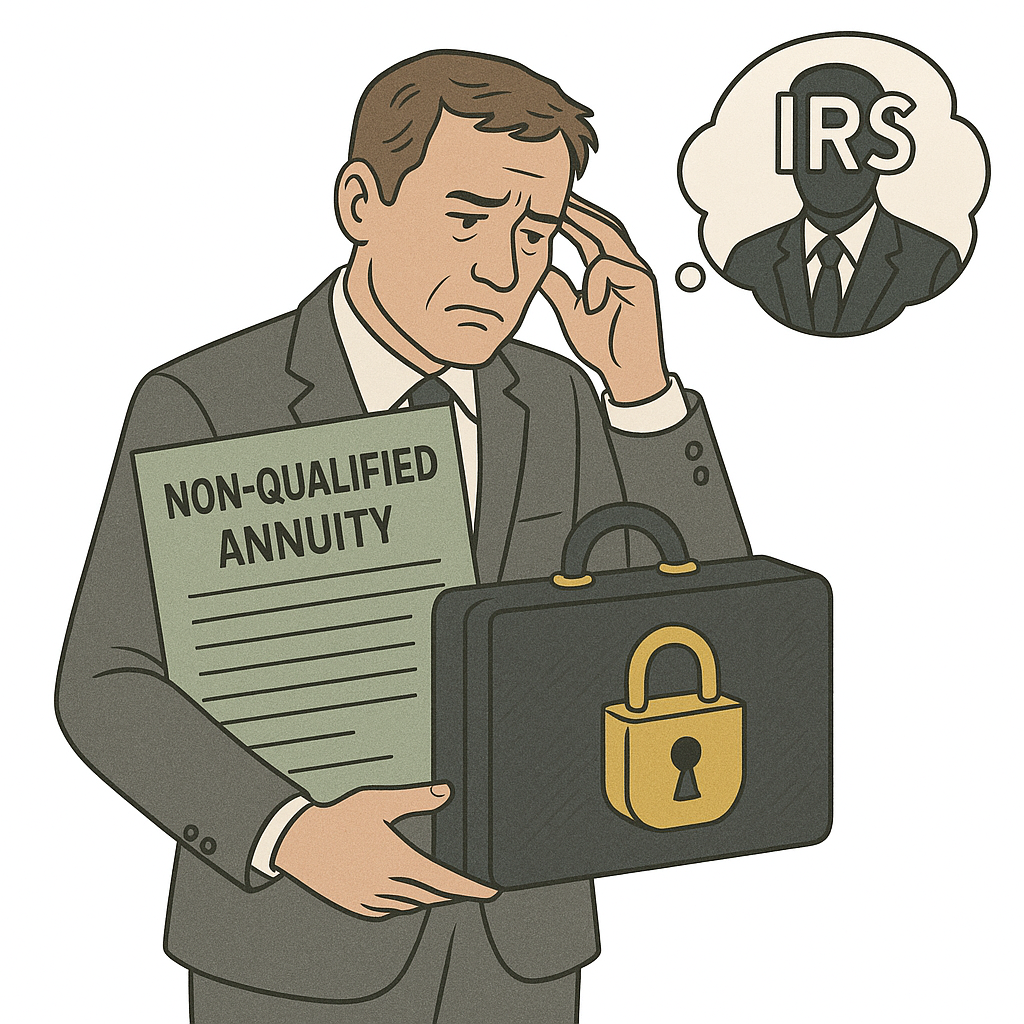In the world of financial planning, few instruments are as misunderstood—or as deceptively complex—as the non-qualified annuity. The non-qualified annuity inheritance pitfalls are significant. Often sold under the banner of “tax-deferred growth” and “guaranteed income,” these non-qualified annuities can serve a purpose during retirement. But like a shiny sports car with no reverse gear, they tend to look better in theory than they perform in practice—especially when inherited.
If you’re considering naming your children or loved ones as beneficiaries of a non-qualified annuity, it’s important to understand the tax headaches and liquidity issues they’ll inherit right alongside the asset.
The Tax Trap That Never Dies
Unlike stocks, mutual funds, or real estate, non-qualified annuities do not receive a step-up in cost basis at death. This is one of the most significant—yet least understood—pitfalls.
Let’s say you purchased a non-qualified annuity for $100,000, and by the time you pass, it’s grown to $250,000. Your heirs will inherit that contract with $150,000 of untaxed ordinary income built in. Yes, you read that right: ordinary income, not long-term capital gains.
This stands in stark contrast to inherited brokerage accounts, which enjoy a step-up in basis to the date-of-death value. A taxable investment account passed on to heirs can often be sold the next day with little or no tax consequences. A non-qualified annuity, however, comes with a ticking tax time bomb that starts the moment your beneficiaries take ownership.
Lack of Liquidity and Rigid Distribution Rules
Unlike a checking account or a portfolio of ETFs, annuities are not exactly nimble. Beneficiaries are generally required to either withdraw the entire contract value within five years or annuitize it over their lifetime. Either way, they’re forced into a distribution schedule—often during their peak earning years—when adding an extra $150,000 in taxable income can wreak havoc on everything from student aid eligibility to Medicare premiums.
And let’s not forget: most annuity carriers don’t exactly make the transfer process a model of efficiency. Navigating distribution paperwork with a call center agent who refers to you only by your claim number doesn’t exactly foster warm memories of the loved one who passed it along.

A Legacy of Frustration, Not Freedom
I often explain this to clients with an analogy: leaving someone a non-qualified annuity is like gifting them a suitcase of cash—but one that’s padlocked, booby-trapped, and comes with a tax auditor attached.
Instead of enabling your heirs to pay off debt, invest, or simply breathe easier, it shackles them to a bureaucratic process riddled with forms, phone calls, and avoidable tax consequences.
A Better Way Forward
If your goal is to leave a financial legacy, there are more elegant and efficient tools at your disposal:
- Tax-efficient investments that receive a step-up in basis.
- Life insurance, which can provide a tax-free death benefit.
- Roth IRAs, which can be structured for generational tax efficiency.
- Trusts, when used properly, can help direct your legacy with clarity and control.
And if you already own a non-qualified annuity? Don’t panic. There are options—1035 exchanges, charitable remainder strategies, or even annuitizing for your own benefit to draw it down in a tax-managed fashion.
Final Thoughts
Annuities have their place—but that place is rarely at the center of a well-orchestrated estate plan. When considered through the lens of intergenerational wealth transfer, the non-qualified annuity inheritance pitfalls can create an inheritance that feels more like catching a hand grenade.
Before you make that kind of legacy decision, sit down with a fiduciary financial advisor who can help you weigh your options—strategically, tax-efficiently, and with your family’s long-term benefit in mind.
If you are thinking about purchasing a non-qualified annuity, schedule an exploratory call with us to get a second opinion. Almega Wealth Management is not an insurance broker. We are fee-only fiduciary advisors dedicated to being bold leaders for our clients, helping them avoid the missteps of incomplete advice.
